britain
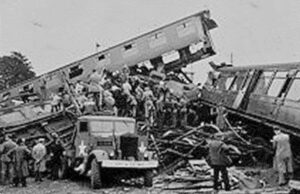 Trainwrecks can obviously happen at any time, but I think the worst time would be in the middle of the night, when the people onboard…other than the crew…are sleeping, or at the very least, dozing. There is nothing worse than being awakened to impending disaster. On September 30, 1945, a train was on its way from Perth to London Euston. The train was the 15-coach overnight Perth to London Euston express hauled by LMS Royal Scot Class 4-6-0 No 6157 The Royal Artilleryman. Part of the journey was to include a diversion, due to engineering work being done on the Watford tunnel. The train was scheduled to switch from the fast to the slow lines at Bourne End, near Hemel Hempstead. For reason unknown, the engineer failed to slow the train down in response to cautionary signals on the approach to the diversion. As a result, the train entered a 15-mile-per-hour turnout at nearly 60 miles per hour.
Trainwrecks can obviously happen at any time, but I think the worst time would be in the middle of the night, when the people onboard…other than the crew…are sleeping, or at the very least, dozing. There is nothing worse than being awakened to impending disaster. On September 30, 1945, a train was on its way from Perth to London Euston. The train was the 15-coach overnight Perth to London Euston express hauled by LMS Royal Scot Class 4-6-0 No 6157 The Royal Artilleryman. Part of the journey was to include a diversion, due to engineering work being done on the Watford tunnel. The train was scheduled to switch from the fast to the slow lines at Bourne End, near Hemel Hempstead. For reason unknown, the engineer failed to slow the train down in response to cautionary signals on the approach to the diversion. As a result, the train entered a 15-mile-per-hour turnout at nearly 60 miles per hour.
They were going far too fast, and the train couldn’t maintain its position on the tracks. The engine and the first six cars overturned and fell down an embankment into a field. When the derailment was over, only the last 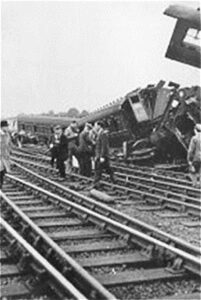 three cars remained on the rails, 43 people were dead, and 65 people were injured. The investigation determined that the cause was driver error, possibly compounded by ambiguous signaling regulations. The fact that the engineer was very experienced with a reputation for being conscientious and had read the notice about the diversion before leaving Crewe, makes the accident that much more odd. It is thought that he may not have appreciated its significance of the diversion. He had worked 26 days consecutively due to staff shortages following the war, so it was possible that he had either momentarily dozed off or that fatigue caused him to momentarily go into “autopilot” mode. Unfortunately, this particular line had not yet been fitted with the Automatic Warning System, which probably could have prevented the accident.
three cars remained on the rails, 43 people were dead, and 65 people were injured. The investigation determined that the cause was driver error, possibly compounded by ambiguous signaling regulations. The fact that the engineer was very experienced with a reputation for being conscientious and had read the notice about the diversion before leaving Crewe, makes the accident that much more odd. It is thought that he may not have appreciated its significance of the diversion. He had worked 26 days consecutively due to staff shortages following the war, so it was possible that he had either momentarily dozed off or that fatigue caused him to momentarily go into “autopilot” mode. Unfortunately, this particular line had not yet been fitted with the Automatic Warning System, which probably could have prevented the accident.
As a train comes up to turns or track changes, the railroad provides advance warning of the turnout by “a color light distant signal showing double yellow, an outer home signal showing green, and two ‘splitting’ semaphore inner homes side by side showing which route was set. The double yellow aspect could have an important extra meaning under Rule 35b(ii), “In some cases, color light signals will exhibit two yellow lights. This indication means – Pass next signal at restricted speed, and if applicable to a junction may denote that the points are set for a diverging route over which the speed restriction shown in the appendix applies.” Because this arrangement is ambiguous, the inspector pointed out that it evidently did not alert the engineer to the 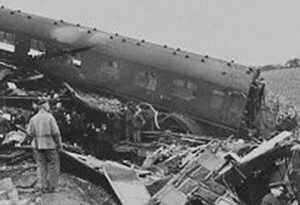 approaching low speed turnout. It was unclear why he failed to notice the diverging route indication of the splitting inner homes. It’s possible that the low sun shining directly in his face would have made observation tiring, but the signals were still clearly visible.
approaching low speed turnout. It was unclear why he failed to notice the diverging route indication of the splitting inner homes. It’s possible that the low sun shining directly in his face would have made observation tiring, but the signals were still clearly visible.
The accident was first reported by a pilot who had just taken off from Bovingdon Aerodrome. As he took off, he could see the accident, so he immediately notified the railway authorities via the Bovingdon Control tower. Airfield staff also helped significantly with assistance after the crash. With the death toll at 43, this became Britain’s joint seventh worst rail disaster in terms of death toll.
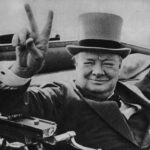 Many people today think of the “V” sign as meaning Peace, but in reality, the “V” sign used today was actually hijacked. The original “V” sign meant Victory, and it was originally presented as such by Winston Spencer-Churchill at a time when Britain is at one of its lowest points in World War II. Churchill is well known as one of the greatest motivators and speech makers of his time. On July 19, 1941, he launched the “V for Victory” campaign across Europe by telling those in Europe under Nazi control to use the letter “V” (for Victory) at every chance they got in speaking and writing. Churchill urged them to write a capital letter “V” to signify “V” for Victory. This was designed to let the Germans know they still had spirit and believed they would overcome Nazi Rule. The morale of the people was so important and this low point in history. When people give up hope, wars are lost…even before the battles are lost.
Many people today think of the “V” sign as meaning Peace, but in reality, the “V” sign used today was actually hijacked. The original “V” sign meant Victory, and it was originally presented as such by Winston Spencer-Churchill at a time when Britain is at one of its lowest points in World War II. Churchill is well known as one of the greatest motivators and speech makers of his time. On July 19, 1941, he launched the “V for Victory” campaign across Europe by telling those in Europe under Nazi control to use the letter “V” (for Victory) at every chance they got in speaking and writing. Churchill urged them to write a capital letter “V” to signify “V” for Victory. This was designed to let the Germans know they still had spirit and believed they would overcome Nazi Rule. The morale of the people was so important and this low point in history. When people give up hope, wars are lost…even before the battles are lost.
In this campaign, Churchill first gave a speech over the radio to tell the people of his plan. Immediately following his speech, the letter “V” began to appear everywhere. It was painted on walls, tapped out in Morse code on shop counters with knuckles or beer glasses or pencil stubs. It quickly became a rallying call across Europe that there was still hope. Many people weren’t aware, but this is also why Churchill’s most famous pictures from World War II always featured him giving the “V” for Victory Sign. He was continuously telling the people not to give up. That all was not lost, and Victory would still be theirs. We all know the “V” sign. Of course, it was made using the index and middle fingers, raised and parted to make a “V” shape while the other fingers are clenched.
These days, it can mean a number of things, and not all are good. When it is displayed with the palm inward 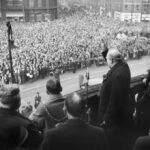 toward the signer, it can be an offensive gesture in some Commonwealth nations (similar to showing the middle finger). That usage dates back to at least 1900. When it is given with the palm outward, it is to be read as a victory sign (“V for Victory”). This usage was first introduced in January 1941 as part of a campaign by the Allies of World War II and made more widely known by Churchill the following July. As most of us know, during the Vietnam War, in the 1960s, the “V sign” with palm outward was widely adopted by the counterculture as a symbol of peace. These days, that is the most commonly used meaning and is commonly called the “peace sign.” Of course, most of us also know that it is used for fun in photographs, especially in East Asia and the United States, where the gesture is also associated with cuteness…the “rabbit ears.” That one is one I have never really figured out. Not what it is, but why people think it’s so funny. Oh well…to each his own.
toward the signer, it can be an offensive gesture in some Commonwealth nations (similar to showing the middle finger). That usage dates back to at least 1900. When it is given with the palm outward, it is to be read as a victory sign (“V for Victory”). This usage was first introduced in January 1941 as part of a campaign by the Allies of World War II and made more widely known by Churchill the following July. As most of us know, during the Vietnam War, in the 1960s, the “V sign” with palm outward was widely adopted by the counterculture as a symbol of peace. These days, that is the most commonly used meaning and is commonly called the “peace sign.” Of course, most of us also know that it is used for fun in photographs, especially in East Asia and the United States, where the gesture is also associated with cuteness…the “rabbit ears.” That one is one I have never really figured out. Not what it is, but why people think it’s so funny. Oh well…to each his own.
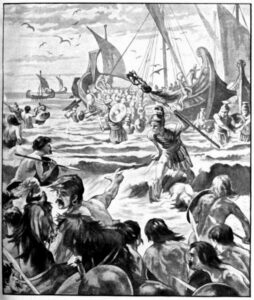
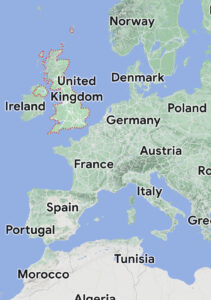 Before Julius Caesar invaded Britain, many Romans didn’t believe it existed. Julius Caesar was the first-ever Roman to invade Britain. He did it twice in the years 55 and 54 BC. Some Romans believed Britain to be just the foot of another huge northern continent. Others thought it was a place full of unbelievable riches, whilst most thought it just didn’t exist.
Before Julius Caesar invaded Britain, many Romans didn’t believe it existed. Julius Caesar was the first-ever Roman to invade Britain. He did it twice in the years 55 and 54 BC. Some Romans believed Britain to be just the foot of another huge northern continent. Others thought it was a place full of unbelievable riches, whilst most thought it just didn’t exist.
In the course of his Gallic Wars, Julius Caesar invaded Britain twice: in 55 and 54 BC. On the first occasion Caesar took with him only two legions and achieved little beyond a landing on the coast of Kent. The second invasion consisted of 628 ships, five legions and 2,000 cavalry. The Roman legion is the largest military unit of the Roman army,  comprised 5,200 infantry and 300 equites (cavalry) in the period of the Roman Republic (509 BC–27 BC) and 5,600 infantry and 200 auxilia in the period of the Roman Empire (27 BC – AD 476). Caesar’s force was so overwhelming that the Britons did not dare contest Caesar’s landing in Kent, waiting instead until he began to move inland. Caesar’s forces eventually made their way into Middlesex and crossed the Thames, forcing the British warlord Cassivellaunus to surrender, after which Caesar set up Mandubracius of the Trinovantes as client king, basically a sub king. As with all conquerors, Caesar included the accounts of both invasions in his Commentarii de Bello Gallico, with the first significant first-hand description of the people, culture, and geography of the island.
comprised 5,200 infantry and 300 equites (cavalry) in the period of the Roman Republic (509 BC–27 BC) and 5,600 infantry and 200 auxilia in the period of the Roman Empire (27 BC – AD 476). Caesar’s force was so overwhelming that the Britons did not dare contest Caesar’s landing in Kent, waiting instead until he began to move inland. Caesar’s forces eventually made their way into Middlesex and crossed the Thames, forcing the British warlord Cassivellaunus to surrender, after which Caesar set up Mandubracius of the Trinovantes as client king, basically a sub king. As with all conquerors, Caesar included the accounts of both invasions in his Commentarii de Bello Gallico, with the first significant first-hand description of the people, culture, and geography of the island. 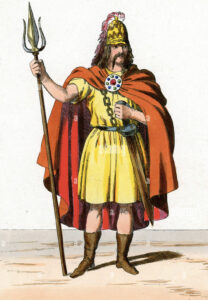
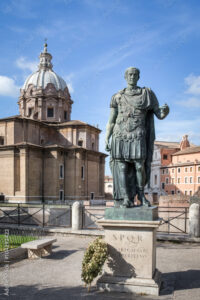 Caesar’s writings are thought to be the start of the written history or at least the protohistory of Britain.
Caesar’s writings are thought to be the start of the written history or at least the protohistory of Britain.
It seems odd to me to think that people could simply not think that Britain exists, but I suppose that in a huge part of our world’s history, and actually still with some people today, it was thought that the Earth is flat, meaning that the horizon we see is all there is. If that is your mindset, it would be easy to limit the Earth to the horizon we can see, but it would not be an assumption that would be based on fact. Now with satellites and airplanes we know that the Earth is definitely round, just like the Bible and most people have said. And that said, we know that Britain existed long before the men of Caesar’s time found and invaded.
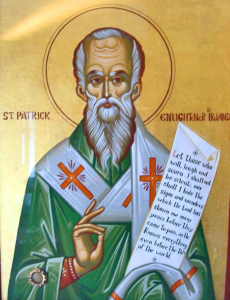 Today is Saint Patrick’s Day, but I don’t believe in Luck. I believe in blessed. Saint Patrick’s Day celebrations are all about “the luck” of the Irish. I’m not real sure where that idea got started, and I know that it’s all in fun, but luck isn’t real, and blessing is. Saint Patrick was born in Britain, but he was kidnapped by Irish pirates at 16 and enslaved for six years. They took him to Ireland where he was enslaved and held captive for six years. Patrick writes in the Confession that “the time he spent in captivity was critical to his spiritual development.” Often it is when we are our lowest time, that we finally look up and find the Lord. He explains that “the Lord had mercy on his youth and ignorance and afforded him the opportunity to be forgiven his sins and convert to Christianity.” While Saint Patrick was held in captivity, he was assigned to work as a shepherd, but while there, he also strengthened his relationship with God through prayer, eventually leading him to convert to Christianity.
Today is Saint Patrick’s Day, but I don’t believe in Luck. I believe in blessed. Saint Patrick’s Day celebrations are all about “the luck” of the Irish. I’m not real sure where that idea got started, and I know that it’s all in fun, but luck isn’t real, and blessing is. Saint Patrick was born in Britain, but he was kidnapped by Irish pirates at 16 and enslaved for six years. They took him to Ireland where he was enslaved and held captive for six years. Patrick writes in the Confession that “the time he spent in captivity was critical to his spiritual development.” Often it is when we are our lowest time, that we finally look up and find the Lord. He explains that “the Lord had mercy on his youth and ignorance and afforded him the opportunity to be forgiven his sins and convert to Christianity.” While Saint Patrick was held in captivity, he was assigned to work as a shepherd, but while there, he also strengthened his relationship with God through prayer, eventually leading him to convert to Christianity.
After six years of captivity, Patrick heard a voice telling him in a dream that he would soon go home, and then that his ship was ready. There was no “luck” to it. God spoke to him in a dream, and he obeyed. He was blessed with his freedom. He immediately took action, and escaping from his master, he  travelled to a port, two hundred miles away. Once there, Patrick found a ship and with difficulty persuaded the captain to take him. After three days of sailing, they landed, presumably in Britain. Odd that they didn’t seem to know. All the passengers and crew left the ship, walking for 28 days in a “wilderness” and almost starving to death. After Patrick prayed for sustenance, they encountered a herd of wild boar, and since this was shortly after Patrick had urged them to put their faith in God, his reputation as a man of God grew. By the time Patrick arrived back to his family, he was a young man of twenty years. Patrick continued to study Christianity.
travelled to a port, two hundred miles away. Once there, Patrick found a ship and with difficulty persuaded the captain to take him. After three days of sailing, they landed, presumably in Britain. Odd that they didn’t seem to know. All the passengers and crew left the ship, walking for 28 days in a “wilderness” and almost starving to death. After Patrick prayed for sustenance, they encountered a herd of wild boar, and since this was shortly after Patrick had urged them to put their faith in God, his reputation as a man of God grew. By the time Patrick arrived back to his family, he was a young man of twenty years. Patrick continued to study Christianity.
After making his escape, Saint Patrick, who wasn’t a saint then, made his way back to Britain, but Ireland beckoned him, and he would eventually go back there. Patrick had a vision a few years after returning home, “I saw a man coming, as it were from Ireland. His name was Victoricus, and he carried many letters, and he gave 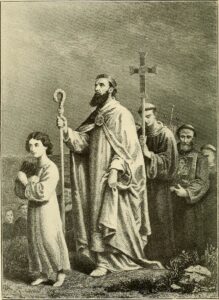 me one of them. I read the heading: ‘The Voice of the Irish,’ As I began the letter, I imagined in that moment that I heard the voice of those very people who were near the wood of Foclut, which is beside the western sea, and they cried out, as with one voice: ‘We appeal to you, holy servant boy, to come and walk among us.'” A.B.E. Hood suggests that the Victoricus of Saint Patrick’s vision may be identified with Saint Victricius, bishop of Rouen in the late fourth century, who had visited Britain in an official capacity in 396. However, Ludwig Bieler disagrees. I guess we will ever really know.
me one of them. I read the heading: ‘The Voice of the Irish,’ As I began the letter, I imagined in that moment that I heard the voice of those very people who were near the wood of Foclut, which is beside the western sea, and they cried out, as with one voice: ‘We appeal to you, holy servant boy, to come and walk among us.'” A.B.E. Hood suggests that the Victoricus of Saint Patrick’s vision may be identified with Saint Victricius, bishop of Rouen in the late fourth century, who had visited Britain in an official capacity in 396. However, Ludwig Bieler disagrees. I guess we will ever really know.
Acting on his vision, Patrick returned to Ireland as a Christian missionary, and that is how he became a patron saint of Ireland. Saint Patrick actually never used a four-leaf clover, but rather he used a three-leaf clover as a way to help people to understand the Trinity (Triune God – Father, Son, and Holy Spirit).

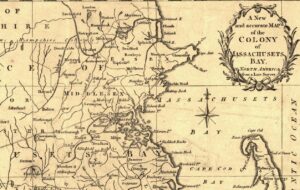 In the late 1600s, Britain and France both owned property in North America, and they were prone to periodic attacks on the colonies belonging to the other. On December 10, 1690, when the Massachusetts Bay Colony launched an ill-fated attack on Quebec, the result was a near-mutiny that forced the Massachusetts Bay Colony to issue the first paper currency in the history of the Western Hemisphere.
In the late 1600s, Britain and France both owned property in North America, and they were prone to periodic attacks on the colonies belonging to the other. On December 10, 1690, when the Massachusetts Bay Colony launched an ill-fated attack on Quebec, the result was a near-mutiny that forced the Massachusetts Bay Colony to issue the first paper currency in the history of the Western Hemisphere.
Sometimes, these “little skirmishes” put the governments in a position of a cash flow problem. They sometimes had to resort to IOUs to pay the men. In 1690, during one such war, Governor William Phips of Britain’s Massachusetts Bay Colony made a promise to his men that he could not keep. Phips was just back from a successful invasion of the French colony of Acadia. When it went so well, he decided to raid Quebec City. For their participation, Phips promised his volunteer troops half the loot. This loot was to be in addition to their usual pay. In those days, the soldiers were usually paid in coins, but sometimes shortages of official currency in the colonies forced armies to temporarily issue IOUs. Sometimes, even that was difficult, for lack of paper, so in one case, the men were actually paid with cut-up playing cards. The troops were then allowed to exchange the playing cards for goods and services until they received their actual pay.
As to Phips…he found himself with a rather large dilemma, because while he made a grand promise, the raid was a failure, when he didn’t manage to take the city. He was forced to return to Massachusetts with a damaged fleet and no treasure. With a shortage of coins and nothing else to pay the troops with, Phips faced a potential mutiny. So…out of options, on December 10th, 1690, the General Court of Massachusetts ordered the printing of a limited amount of government-backed, paper currency to pay the soldiers. It was the first such printing of paper money in North America. A few months later, with tax season approaching, a law was passed removing the limit on how much currency could be printed, calling for the immediate printing of more, and permitting the use of paper currency for the payment of taxes, which seems odd considering it had no value.
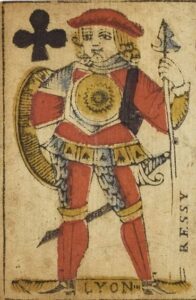
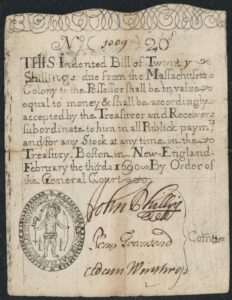 People didn’t trust the paper currency, making it unpopular for anything except paying taxes and before long, it was phased out. Nevertheless, within a few years, paper currency returned to Massachusetts. The Bank of England began issuing banknotes in 1695, also to pay for war against the French, and they became increasingly common throughout the 18th Century. Paper money has continued to cause controversy throughout the early history of the United States, and in many cases, remains so to this day. It was tied to the value of gold for a surprisingly long time, but in 1973 President Richard Nixon officially ended the international convertibility of the US dollar into gold. The printing of paper currency has always been a bit of a shady venture, because it is almost always done without the backing of gold. Without gold to back up the value of the paper currency, the economy is in danger.
People didn’t trust the paper currency, making it unpopular for anything except paying taxes and before long, it was phased out. Nevertheless, within a few years, paper currency returned to Massachusetts. The Bank of England began issuing banknotes in 1695, also to pay for war against the French, and they became increasingly common throughout the 18th Century. Paper money has continued to cause controversy throughout the early history of the United States, and in many cases, remains so to this day. It was tied to the value of gold for a surprisingly long time, but in 1973 President Richard Nixon officially ended the international convertibility of the US dollar into gold. The printing of paper currency has always been a bit of a shady venture, because it is almost always done without the backing of gold. Without gold to back up the value of the paper currency, the economy is in danger.
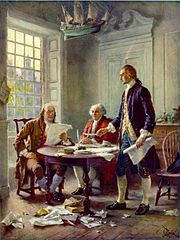 When the British Colonies, also known as the Thirteen Colonies or the early United States, were founded in the 1600s, the colonies were left to govern themselves for the most part. The land was really an expansion of power for Britain. Nevertheless, there were wars that took place in the new land and with them the costs of war, and because the colonies were owned by the British government, the cost of war fell on them. The cost of victory in the 1754 to 1763 French and Indian War and the 1756 to 1763 Seven Years’ War left the British government deeply in debt. The wars were fought in the colonies, but were equipped and populated with the British forces stationed there, at the cost of millions of British funds. The British government decided to impose The Stamp Act and Townshend Acts to pay for the wars, which provoked colonial opposition and unrest, leading to the 1770 Boston Massacre and 1773 Boston Tea Party. Then, came the Intolerable Acts, meant to punish the Massachusetts colonists for their defiance in the Tea Party protest in reaction to changes in taxation by the British Government, in spring 1774 upon Massachusetts. It was enough. These acts took away self-governance and rights that Massachusetts had enjoyed since its founding, and triggered outrage and indignation in the Thirteen Colonies, and twelve colonies sent delegates to the First Continental Congress, from September 5, 1774 to October 26, 1774. Their goal was to draft a petition to the King and organize a boycott of British goods. It was these acts…the acts that took away self-governance and other rights that triggered outrage and indignation in the Thirteen Colonies. We have often heard it called “taxation without representation” and it would never be tolerated. This nation had tasted freedom, and would never go back. These acts were key developments in the outbreak of the American Revolutionary War in April 1775.
When the British Colonies, also known as the Thirteen Colonies or the early United States, were founded in the 1600s, the colonies were left to govern themselves for the most part. The land was really an expansion of power for Britain. Nevertheless, there were wars that took place in the new land and with them the costs of war, and because the colonies were owned by the British government, the cost of war fell on them. The cost of victory in the 1754 to 1763 French and Indian War and the 1756 to 1763 Seven Years’ War left the British government deeply in debt. The wars were fought in the colonies, but were equipped and populated with the British forces stationed there, at the cost of millions of British funds. The British government decided to impose The Stamp Act and Townshend Acts to pay for the wars, which provoked colonial opposition and unrest, leading to the 1770 Boston Massacre and 1773 Boston Tea Party. Then, came the Intolerable Acts, meant to punish the Massachusetts colonists for their defiance in the Tea Party protest in reaction to changes in taxation by the British Government, in spring 1774 upon Massachusetts. It was enough. These acts took away self-governance and rights that Massachusetts had enjoyed since its founding, and triggered outrage and indignation in the Thirteen Colonies, and twelve colonies sent delegates to the First Continental Congress, from September 5, 1774 to October 26, 1774. Their goal was to draft a petition to the King and organize a boycott of British goods. It was these acts…the acts that took away self-governance and other rights that triggered outrage and indignation in the Thirteen Colonies. We have often heard it called “taxation without representation” and it would never be tolerated. This nation had tasted freedom, and would never go back. These acts were key developments in the outbreak of the American Revolutionary War in April 1775.
The Revolutionary War was not going to be a short war. It would rage from April 19, 1775 to September 3, 1783…eight long years. For seven years after the United States Declaration of Independence was adopted by the Second Continental Congress at its meeting in Philadelphia, Pennsylvania, on July 4, 1776, the war still raged on. I don’t suppose any nation would want to simply lay down its control, but the reality is that Britain had lost its control many years before, and it was time to cut their losses and go home.
It was on June 11, 1776, that the Continental Congress made the decision and selected Thomas Jefferson of Virginia, John Adams of Massachusetts, Benjamin Franklin of Pennsylvania, Roger Sherman of Connecticut and Robert R. Livingston of New York to draft our Declaration of Independence. That moment truly sealed the fate of the Britain ownership of this nation. The words they penned would be taught in schools, put on documents, t-shirts, decals, and many other forms of media. Because John Adams knew of Thomas Jefferson’s prowess with a pen, he urged him to author the first draft of the document, which was then carefully revised by Adams and Franklin before being given to Congress for review on June 28. I don’t know how many have ever read the entire Declaration of Independence, but I have chosen to place it in its unedited entirety, because I think we need to know why our founding fathers fought so hard for our independence. The 4th of July is not about picnics and fireworks, it is about freedom, and we must never forget that…nor the five men who wrote it and the entire congress who signed it.
The Declaration of Independence
“When in the Course of human events, it becomes necessary for one people to dissolve the political bands which have connected them with another, and to assume among the powers of the earth, the separate and equal station to which the Laws of Nature and of Nature’s God entitle them, a decent respect to the opinions of mankind requires that they should declare the causes which impel them to the separation.
We hold these truths to be self-evident, that all men are created equal, that they are endowed by their Creator with certain unalienable Rights, that among these are Life, Liberty and the pursuit of Happiness.–That to secure these rights, Governments are instituted among Men, deriving their just powers from the consent of the governed, –That whenever any Form of Government becomes destructive of these ends, it is the Right of the People to alter or to abolish it, and to institute new Government, laying its foundation on such principles and organizing its powers in such form, as to them shall seem most likely to effect their Safety and Happiness. Prudence, indeed, will dictate that Governments long established should not be changed for light and transient causes; and accordingly all experience hath shewn, that mankind are more disposed to suffer, while evils are sufferable, than to right themselves by abolishing the forms to which they are accustomed. But when a long train of abuses and usurpations, pursuing invariably the same Object evinces a design to reduce them under absolute Despotism, it is their right, it is their duty, to throw off such Government, and to provide new Guards for their future security.–Such has been the patient sufferance of these Colonies; and such is now the necessity which constrains them to alter their former Systems of Government. The history of the present King of Great Britain is a history of repeated injuries and usurpations, all having in direct object the establishment of an absolute Tyranny over these States. To prove this, let Facts be submitted to a candid world.
He has refused his Assent to Laws, the most wholesome and necessary for the public good.
He has forbidden his Governors to pass Laws of immediate and pressing importance, unless suspended in their operation till his Assent should be obtained; and when so suspended, he has utterly neglected to attend to them.
He has refused to pass other Laws for the accommodation of large districts of people, unless those people would relinquish the right of Representation in the Legislature, a right inestimable to them and formidable to tyrants only.
He has called together legislative bodies at places unusual, uncomfortable, and distant from the depository of their public Records, for the sole purpose of fatiguing them into compliance with his measures.
He has dissolved Representative Houses repeatedly, for opposing with manly firmness his invasions on the rights of the people.
He has refused for a long time, after such dissolutions, to cause others to be elected; whereby the Legislative powers, incapable of Annihilation, have returned to the People at large for their exercise; the State remaining in the mean time exposed to all the dangers of invasion from without, and convulsions within.
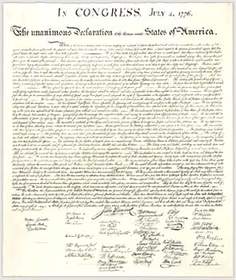
He has endeavoured to prevent the population of these States; for that purpose obstructing the Laws for Naturalization of Foreigners; refusing to pass others to encourage their migrations hither, and raising the conditions of new Appropriations of Lands.
He has obstructed the Administration of Justice, by refusing his Assent to Laws for establishing Judiciary powers.
He has made Judges dependent on his Will alone, for the tenure of their offices, and the amount and payment of their salaries.
He has erected a multitude of New Offices, and sent hither swarms of Officers to harrass our people, and eat out their substance.
He has kept among us, in times of peace, Standing Armies without the Consent of our legislatures.
He has affected to render the Military independent of and superior to the Civil power.
He has combined with others to subject us to a jurisdiction foreign to our constitution, and unacknowledged by our laws; giving his Assent to their Acts of pretended Legislation:
For Quartering large bodies of armed troops among us:
For protecting them, by a mock Trial, from punishment for any Murders which they should commit on the Inhabitants of these States:
For cutting off our Trade with all parts of the world:
For imposing Taxes on us without our Consent:
For depriving us in many cases, of the benefits of Trial by Jury:
For transporting us beyond Seas to be tried for pretended offences
For abolishing the free System of English Laws in a neighbouring Province, establishing therein an Arbitrary government, and enlarging its Boundaries so as to render it at once an example and fit instrument for introducing the same absolute rule into these Colonies:
For taking away our Charters, abolishing our most valuable Laws, and altering fundamentally the Forms of our Governments:
For suspending our own Legislatures, and declaring themselves invested with power to legislate for us in all cases whatsoever.
He has abdicated Government here, by declaring us out of his Protection and waging War against us.
He has plundered our seas, ravaged our Coasts, burnt our towns, and destroyed the lives of our people.
He is at this time transporting large Armies of foreign Mercenaries to compleat the works of death, desolation and tyranny, already begun with circumstances of Cruelty & perfidy scarcely paralleled in the most barbarous ages, and totally unworthy the Head of a civilized nation.
He has constrained our fellow Citizens taken Captive on the high Seas to bear Arms against their Country, to become the executioners of their friends and Brethren, or to fall themselves by their Hands.
He has excited domestic insurrections amongst us, and has endeavoured to bring on the inhabitants of our frontiers, the merciless Indian Savages, whose known rule of warfare, is an undistinguished destruction of all ages, sexes and conditions.
In every stage of these Oppressions We have Petitioned for Redress in the most humble terms: Our repeated Petitions have been answered only by repeated injury. A Prince whose character is thus marked by every act which may define a Tyrant, is unfit to be the ruler of a free people.
Nor have We been wanting in attentions to our Brittish brethren. We have warned them from time to time of attempts by their legislature to extend an unwarrantable jurisdiction over us. We have reminded them of the circumstances of our emigration and settlement here. We have appealed to their native justice and magnanimity, and we have conjured them by the ties of our common kindred to disavow these usurpations, which, would inevitably interrupt our connections and correspondence. They too have been deaf to the voice of justice and of consanguinity. We must, therefore, acquiesce in the necessity, which denounces our Separation, and hold them, as we hold the rest of mankind, Enemies in War, in Peace Friends.
We, therefore, the Representatives of the united States of America, in General Congress, Assembled, appealing to the Supreme Judge of the world for the rectitude of our intentions, do, in the Name, and by Authority of the good People of these Colonies, solemnly publish and declare, That these United Colonies are, and of Right  ought to be Free and Independent States; that they are Absolved from all Allegiance to the British Crown, and that all political connection between them and the State of Great Britain, is and ought to be totally dissolved; and that as Free and Independent States, they have full Power to levy War, conclude Peace, contract Alliances, establish Commerce, and to do all other Acts and Things which Independent States may of right do. And for the support of this Declaration, with a firm reliance on the protection of divine Providence, we mutually pledge to each other our Lives, our Fortunes and our sacred Honor.”
ought to be Free and Independent States; that they are Absolved from all Allegiance to the British Crown, and that all political connection between them and the State of Great Britain, is and ought to be totally dissolved; and that as Free and Independent States, they have full Power to levy War, conclude Peace, contract Alliances, establish Commerce, and to do all other Acts and Things which Independent States may of right do. And for the support of this Declaration, with a firm reliance on the protection of divine Providence, we mutually pledge to each other our Lives, our Fortunes and our sacred Honor.”
 Shergar was a racehorse with the possibility for a great future as a stud horse following his 1981 retirement, but that future was cut short on February 8, 1983, when he was stolen. Shergar was born on March 3, 1978. He was an Irish-bred, British-trained thoroughbred racehorse. Shergar’s owner, The Aga Khan, sent the horse for training in Britain in 1979 and 1980. Shergar began his first season of racing in September 1980 and ran two races that year. He won one and came second in the other. Then, in 1981 he ran in six races, winning five of them. He was an amazing horse. In June that year, he won the 202nd Epsom Derby by ten lengths, which is the longest winning margin in the race’s history. Three weeks later he won the Irish Sweeps Derby by four lengths; a month after that he won the King George VI and Queen Elizabeth Stakes by four lengths. In his final race of the year he came in fourth, and the Aga Khan took the decision to retire him to stud in Ireland. I suppose that like many sports, there is a short window of opportunity with a racehorse, although it seems to me that Shergar had a very short career, but a promising future in stud service to breed racehorses.
Shergar was a racehorse with the possibility for a great future as a stud horse following his 1981 retirement, but that future was cut short on February 8, 1983, when he was stolen. Shergar was born on March 3, 1978. He was an Irish-bred, British-trained thoroughbred racehorse. Shergar’s owner, The Aga Khan, sent the horse for training in Britain in 1979 and 1980. Shergar began his first season of racing in September 1980 and ran two races that year. He won one and came second in the other. Then, in 1981 he ran in six races, winning five of them. He was an amazing horse. In June that year, he won the 202nd Epsom Derby by ten lengths, which is the longest winning margin in the race’s history. Three weeks later he won the Irish Sweeps Derby by four lengths; a month after that he won the King George VI and Queen Elizabeth Stakes by four lengths. In his final race of the year he came in fourth, and the Aga Khan took the decision to retire him to stud in Ireland. I suppose that like many sports, there is a short window of opportunity with a racehorse, although it seems to me that Shergar had a very short career, but a promising future in stud service to breed racehorses.
In 1981 he was retired to what was then the Ballymany Stud in County Kildare, Ireland. Then, in 1983 he was stolen from the stud, and a ransom of £2 million was demanded. The ransom was not paid, and soon the negotiations were broken off by the thieves. In 1999 a confidential informant, formerly in the Provisional Irish Republican Army (IRA), stated that they stole the horse. The IRA has never admitted any role in the theft. After Shergar’s Epsom Derby win, the Aga Khan sold 40 shares in the horse, valuing it at £10 million. Retaining six shares, he created an owners’ syndicate with the remaining 34 members. Shergar was stolen from the Aga Khan’s stud farm by an armed gang on February 8, 1983. Negotiations were conducted with the thieves, but the gang broke off all communication after four days when the syndicate did not accept as truth the proof they provided that the horse was still alive. In 1999 Sean O’Callaghan, a former member of the IRA and probably the confidential informant, published details of the theft and stated that it was an IRA operation to raise money for arms. He said that very soon after the theft, Shergar panicked and damaged his leg, which led to him being killed by the gang. An investigation by The Sunday Telegraph concluded that the horse was shot four days after the theft, or right at the time they stopped negotiations.
Whatever happened to Shergar, there have never been any arrests in the case. Shergar’s body has never been recovered or identified. Some people think it is likely that the body was buried near Aughnasheelin, near Ballinamore, County Leitrim. The Shergar Cup was inaugurated in 1999 in honor of Shergar. His story has been made into movies, several books, and two documentaries. Shergar was a great horse, and should have been allowed to live out his life, but people who only wanted to make money to to buy arms, in an effort to bring mass destruction, couldn’t allow this beautiful horse to live. Anytime a horse is stolen, it is traumatic for the horse. Their schedule is disrupted, they don’t know the people who are taking care of them now, and it is possible that care is not what it should be. The panic that happened to poor Shergar should never have happened. I have no doubt they killed that poor horse, but we will never know for sure.
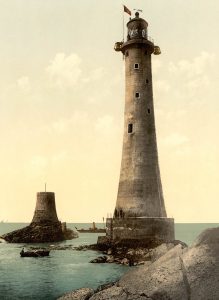 These days, we have advance warnings about potentially dangerous storms heading our way. Of course, the meteorologists aren’t always right on with their predictions, but often they are incredibly accurate. In centuries gone by, it was often the elder men, the ones who had been around a while, who had watched the sky, to see the signs that would give them clues as to coming weather. Unfortunately, on November 14, 1703, any clues they might have seen would not do any good for the people of England. The unusual weather began that day with strong winds from the Atlantic Ocean that battered the southern part of Britain and Wales. The pounding winds damaged many homes and other buildings, but the hurricane-like storm only began doing serious damage on November 26. Then the winds estimated at over 80 miles per hour, blew bricks from some buildings and embedded them in others. Wood beams, separated from buildings, flew through the air and killed hundreds across the south of the country. Towns such as Plymouth, Hull, Cowes, Portsmouth, and Bristol were devastated.
These days, we have advance warnings about potentially dangerous storms heading our way. Of course, the meteorologists aren’t always right on with their predictions, but often they are incredibly accurate. In centuries gone by, it was often the elder men, the ones who had been around a while, who had watched the sky, to see the signs that would give them clues as to coming weather. Unfortunately, on November 14, 1703, any clues they might have seen would not do any good for the people of England. The unusual weather began that day with strong winds from the Atlantic Ocean that battered the southern part of Britain and Wales. The pounding winds damaged many homes and other buildings, but the hurricane-like storm only began doing serious damage on November 26. Then the winds estimated at over 80 miles per hour, blew bricks from some buildings and embedded them in others. Wood beams, separated from buildings, flew through the air and killed hundreds across the south of the country. Towns such as Plymouth, Hull, Cowes, Portsmouth, and Bristol were devastated.
Finally, on November 27, 1703, the storm system finally dissipated over England. For almost two weeks, it had ripped the country nearly to shreds. With its hurricane force winds, the storm killed somewhere between 10,000 and 30,000 people. Hundreds of Royal Navy ships were lost to the storm, the worst in Britain’s history. It was the loss of the 300 Royal Navy ships that really caused the death toll to rise. The ships that were anchored carried some 8,000 sailors. All were lost. Then, the Eddystone Lighthouse, which had been built on a 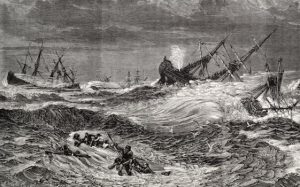 rock outcropping 14 miles from Plymouth, was blown over by the storm. All of its residents, including its designer, Henry Winstanley, were killed. Huge waves on the Thames River sent water six feet higher than ever before recorded near London. More than 5,000 homes along the river were destroyed.
rock outcropping 14 miles from Plymouth, was blown over by the storm. All of its residents, including its designer, Henry Winstanley, were killed. Huge waves on the Thames River sent water six feet higher than ever before recorded near London. More than 5,000 homes along the river were destroyed.
The author Daniel Defoe, witnessed the storm, and it had such an impact on him that he wrote his first book, entitled “The Storm” the following year. In “The Storm” he described the storm as an “Army of Terror in its furious March.” Sometimes the best inspiration for writing a book is the events of real life. Defoe would later go on to write the well known novel “Robinson Crusoe.”
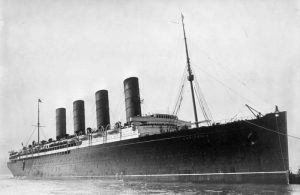 Most people have heard of the Titanic sinking, and how disaster could have been prevented, had they just slowed down, listened to the warnings, and had they had enough lifeboats. There is, however, another ship sinking that not so many people have heard of, or if they had, they didn’t pay much attention to. It is the Lusitania. Like the Titanic, the sinking of the Lusitania could have been prevented too, had a number of simple precautions been taken, such as not to sail at all that fateful May day in 1915.
Most people have heard of the Titanic sinking, and how disaster could have been prevented, had they just slowed down, listened to the warnings, and had they had enough lifeboats. There is, however, another ship sinking that not so many people have heard of, or if they had, they didn’t pay much attention to. It is the Lusitania. Like the Titanic, the sinking of the Lusitania could have been prevented too, had a number of simple precautions been taken, such as not to sail at all that fateful May day in 1915.
RMS Lusitania left New York for Britain on May 1, 1915, unfortunately during a time when German submarine warfare was intensifying in the Atlantic. On February 4, 1915, Germany had declared the seas around the United Kingdom a war zone, and the German embassy in the United States had placed newspaper advertisements warning people of the dangers of sailing on Lusitania. Not to defend the Germans, but they had warned people that they would attack all ships, military or passenger. Unfortunately, not many people boarding Lusitania that morning had time to read the paper before embarking on their journey. It amazes me that it was left to the people, who were told that the ship could outrun the German U-boats. They were also told that they 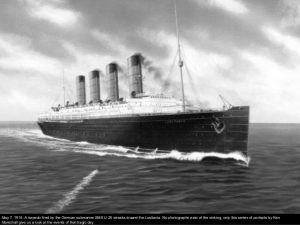 would have escort ships as they entered the war zone. And, they were told that the U-boats were not attacking neutral passenger liners. Unfortunately, these things were not factual. Part of the problem was that the Allies had begun disguising war ships as passenger ships on the assumption that the Germans would not attack passenger ships. Other passenger ships were actually used to transport soldiers and ammunition, or even just ammunition, in the thought that they would be safe from harm that way. The Allies were also supposed to have escort ships to take the passenger ships, but that did not happen in the case of the Lusitania.
would have escort ships as they entered the war zone. And, they were told that the U-boats were not attacking neutral passenger liners. Unfortunately, these things were not factual. Part of the problem was that the Allies had begun disguising war ships as passenger ships on the assumption that the Germans would not attack passenger ships. Other passenger ships were actually used to transport soldiers and ammunition, or even just ammunition, in the thought that they would be safe from harm that way. The Allies were also supposed to have escort ships to take the passenger ships, but that did not happen in the case of the Lusitania.
The sinking of the Cunard ocean liner RMS Lusitania occurred on Friday, May 7, 1915 during the First World War, as Germany waged submarine warfare against the United Kingdom which had implemented a naval blockade of Germany. The ship was identified and torpedoed by the German U-boat U-20 and sank in just 18 minutes, and also took on a heavy starboard list. The Lusitania went down 11 miles off the Old Head of Kinsale, 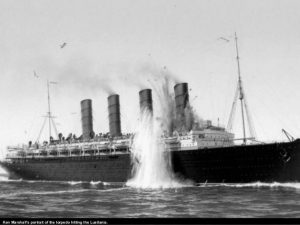 Ireland, killing 1,198 and leaving 761 survivors. The sinking turned public opinion in many countries against Germany, and it was a key element in the American entry into World War I. The torpedoing and subsequent sinking became an iconic symbol in military recruiting campaigns. The injustice of it brought about the outrage that would likely cause soldiers to enlist. Still, the United States did not immediately enter into the war. The American government first issued a severe protest to Germany…a waste of time really. Then, following immense pressure from the United States and recognizing the limited effectiveness of the policy, Germany abandoned unrestricted submarine warfare in September 1915.
Ireland, killing 1,198 and leaving 761 survivors. The sinking turned public opinion in many countries against Germany, and it was a key element in the American entry into World War I. The torpedoing and subsequent sinking became an iconic symbol in military recruiting campaigns. The injustice of it brought about the outrage that would likely cause soldiers to enlist. Still, the United States did not immediately enter into the war. The American government first issued a severe protest to Germany…a waste of time really. Then, following immense pressure from the United States and recognizing the limited effectiveness of the policy, Germany abandoned unrestricted submarine warfare in September 1915.
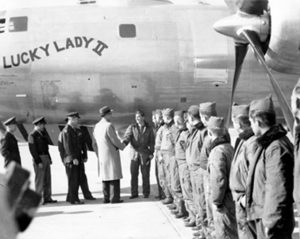 When flight first began, I seriously doubt that anyone had any idea how far it would go. Many people said, “If God had wanted us to fly, He would have given us wings!” Of course, wings can be added…if you know how to add them. The Wright brothers figured out how to add those wings, and how to make them fly. Nevertheless, any kind of long distance fight was still far in the future, back then.
When flight first began, I seriously doubt that anyone had any idea how far it would go. Many people said, “If God had wanted us to fly, He would have given us wings!” Of course, wings can be added…if you know how to add them. The Wright brothers figured out how to add those wings, and how to make them fly. Nevertheless, any kind of long distance fight was still far in the future, back then.
Then, on July 25, 1909, Louis Blériot took off from a field in France, and flew his flimsy monoplane northward for half an hour, and landed near Dover Castle in England. The flight…at the time, daring beyond belief…caused a sensation in Britain. No one thought it could be done, and much less that a mere 40 years later, a plane would actually make a non-stop around the world trip…successfully. Nevertheless, forty years later, Captain James G. Gallagher and a 13-man crew took off from Carswell AFB, Texas, in a B-50 bomber named Lucky Lady II. Four days later they landed back at Carswell. This achievement, the first nonstop flight around the world, also stirred the public imagination.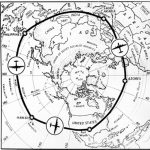
Neither event involved a major breakthrough in technology, but each was significant for other reasons. Blériot’s flight lasted a mere 37 minutes. In several demonstration flights in France during the previous year, Wilbur Wright had stayed aloft much longer. Blériot was the first to use a combination of hand/arm-operated joystick and foot-operated rudder control, that is in use to the present day, for the basic format of aerodynamic aircraft control systems. Blériot was also the first to make a working, powered, piloted monoplane. In 1909 he became world-famous for making the first airplane flight across the English Channel.
Lucky Lady II took off from Carswell Air Force Base in Fort Worth, Texas. A B-50 Superfortress, Lucky Lady II 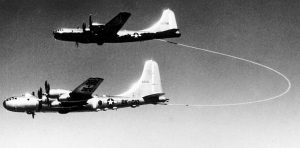 flew the first nonstop round-the-world flight. The aircraft averaged 249 miles per hour on its 23,452 mile flight. The Lucky Lady II was refueled four times in the air by B-29 tanker planes and on March 2 returned to the United States after 94 hours in the air. It was a record breaking flight. Of course, the record would not last forever. In December 1986, Voyager, a lightweight propeller plane constructed mainly of plastic, landed at Edwards Air Force Base in Muroc, California, having completed the first global flight without refueling. Flight will most likely never stop improving.
flew the first nonstop round-the-world flight. The aircraft averaged 249 miles per hour on its 23,452 mile flight. The Lucky Lady II was refueled four times in the air by B-29 tanker planes and on March 2 returned to the United States after 94 hours in the air. It was a record breaking flight. Of course, the record would not last forever. In December 1986, Voyager, a lightweight propeller plane constructed mainly of plastic, landed at Edwards Air Force Base in Muroc, California, having completed the first global flight without refueling. Flight will most likely never stop improving.

